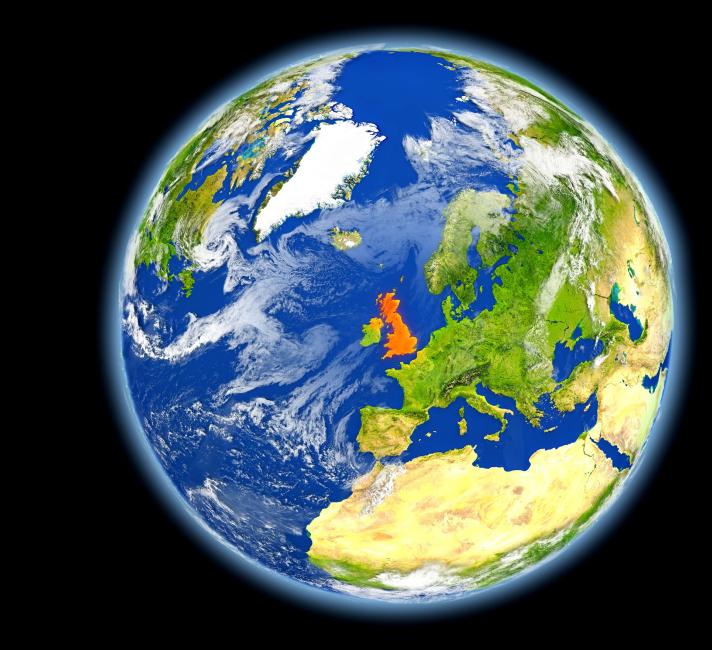
The UK's Global Footprint
The UK is fuelling the destruction of nature at home and abroad through our production and consumption, pushing against environmental limits the planet cannot exceed if future generations are to have sufficient resources to thrive.
The Global Biodiversity Framework, that the UK Government signed up to in 2022, includes a target “to reduce the global footprint of consumption”.
WWF-UK is working with partners to strengthen policy and action on our consumption and production footprint by improving science, evidence and guidance on implementation.
WWF-UK and 3Keel’s report Thriving within our planetary means: reducing the UK's production and consumption footprint by 2030 (Global Footprint Report) shows that to meet planetary limits the UK must reduce its global footprint by around three quarters by 2030.
The report proposes reduction targets for ten key drivers of environmental impact and outlines the actions we need to take to achieve them.
What is the UK’s Footprint?
A ‘footprint’ refers to the drivers and pressures that harm the environment, such as extraction of metals, production of goods, consumption of food and related socioeconomic activities. In a nutshell, it explains the environmental impact of the things we produce and consume.
DEEP DIVES: DRIVERS OF OUR GLOBAL FOOTPRINT
The sections below take a closer look at some of the key drivers of our global footprint and links to our reports on these sectors.
LAND USE CHANGE AND DEGRADATION
This footprint focuses on deforestation and conversion of ecosystems, and the degradation of soil health, forests and other natural ecosystems. The dominant drivers of these impacts globally are agriculture and forestry.
The size of the UK’s overseas land footprint was highlighted in WWF and RSPB’s 2020 Riskier Business: the UK’s overseas land footprint report which found that from 2016 to 2018, over 21Mha of land in other countries (equivalent to 88% of the UK’s land area) were required to produce just 7 commodities, including cocoa, palm oil, timber and soy, used and consumed in the UK.
To reduce this footprint, the Global Footprint Report sets out that:
- UK supply chains of agricultural and forest commodities must be responsible for no deforestation or conversion of ecosystems no later than 2023.
- Degradation of UK nature must be halted, and degradation of nature overseas resulting from UK demand must be substantially minimised, by 2030.
To achieve these goals, the report recommends starting by establishing a robust due diligence obligation on businesses that also applies to the finance sector, and to both illegal and legal deforestation and conversion.
Our new report with 3Keel and Environment systems, Due Negligence, highlights the issues with the UK government’s proposed deforestation due diligence regulation and the need to move beyond an approach based on producer country laws in order to remove deforestation and conversion from UK supply chains.
MARINE RESOURCE USE
Marine resources include fisheries products and aquatic plants and algae directly imported and consumed, as well as marine resources embedded in other products, like fish feed used in livestock production.
The Global Footprint Report target is for 100% of marine resources to be from sustainable sources by 2030. Among other actions, this requires the UK to eradicate illegal, unregulated and unreported fishing in UK waters and from imports of fish and related products, as well as ensuring all UK and imported fish stocks are fished at or below levels capable of producing maximum sustainable yield.
Reliance on fish meal and oil in feeds needs to be reduced with the promotion of sustainable alternative feed. Incidental catches and killing of vulnerable marine species in seafood production should be minimised.
The Risky Seafood Business Report evidences the global environmental and social footprint of the UK’s seafood production and consumption, and of value chains reliant on marine species. Read the summary report and technical report.
MATERIAL CONSUMPTION
Our material footprint relates to the UK’s consumption of materials including fossil fuels, metal ores and non-metal ores.
The Global Footprint Report sets out that the UK must reduce its material consumption footprint (of non-biomass materials) by 50% by 2030. To reach this target, the report recommends reducing our use of fossil fuels by 36% by 2030 and eliminating 43% of avoidable plastic waste.
GREENHOUSE GAS EMISSIONS
Climate change due to the increasing concentration of greenhouse gases (GHGs) in the atmosphere is a major driver of habitat and species loss.
The greenhouse gas emissions target in the Global Footprint Report sets out that the UK must reduce its domestic emissions including international shipping and aviation by 39% and reduce the overseas carbon footprint of UK’s consumption of imports by 33% by 2030.
WWF’s 2020 report, Carbon Footprint: Exploring the UK’s contribution to climate change revealed that nearly half of the UK’s carbon footprint comes from emissions released overseas to satisfy UK-based consumption. Between 1990 and 2016 emissions within the UK’s borders reduced by 41% but the consumption-based footprint only dropped 15%, mainly due to goods and services coming from abroad.
NUTRIENT USE
Our nutrient footprint relates to the addition of nitrogen (N) and phosphorus (P) to agricultural land in fertiliser. Rates of nitrate and phosphate use in the UK are well above the global average.
According to our Global Footprint Report, the UK must reduce its nitrogen (N) and phosphorus (P) use by at least 80%.
To reach this target, it recommends a range of actions, including increasing nitrogen use efficiency to at least 80% for all farmers through farming techniques, and increasing the use of nitrogen-conserving farming practices.
Our forthcoming report on nitrogen use examines the impacts of nitrogen use driven by in the UK’s consumption and production. It identifies the priorities and key interventions that will be required as part of a comprehensive strategy to tackle the UK’s nitrogen emissions, providing policy recommendations to tackle our nitrogen footprint.
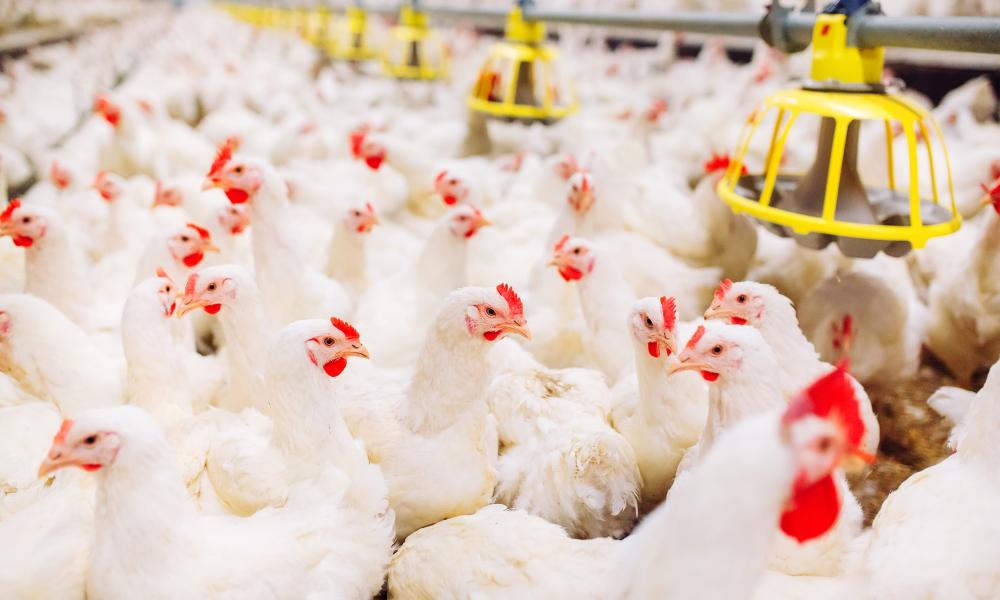
FIXING THE FOOD SYSTEM TO REDUCE OUR FOOTPRINT
FIXING THE FOOD SYSTEM TO REDUCE OUR FOOTPRINT
The UK’s production and consumption of food is a dominant driver of the global footprint.
The environmental damage caused by our current food system, from field to plate, is present across all impact categories in the Global Footprint Report, including marine resource use, land-use change and degradation, materials consumption, water pollution, nutrient use and greenhouse gas emissions.
All food companies have a responsibility to help fix the food system.
WWF, along with our partner Tesco, have set out an approach to identify the most pressing issues in the food system and what needs to be done to address them. Together, we have set an ambitious aim to halve the environmental impact of the average UK shopping basket. To track the progress of this we have developed the Sustainable Basket Metric.
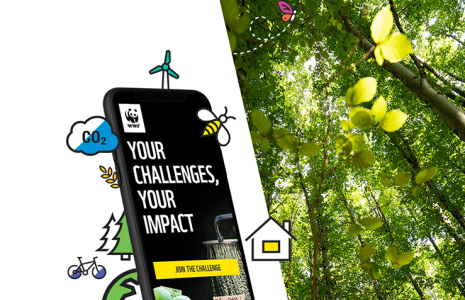
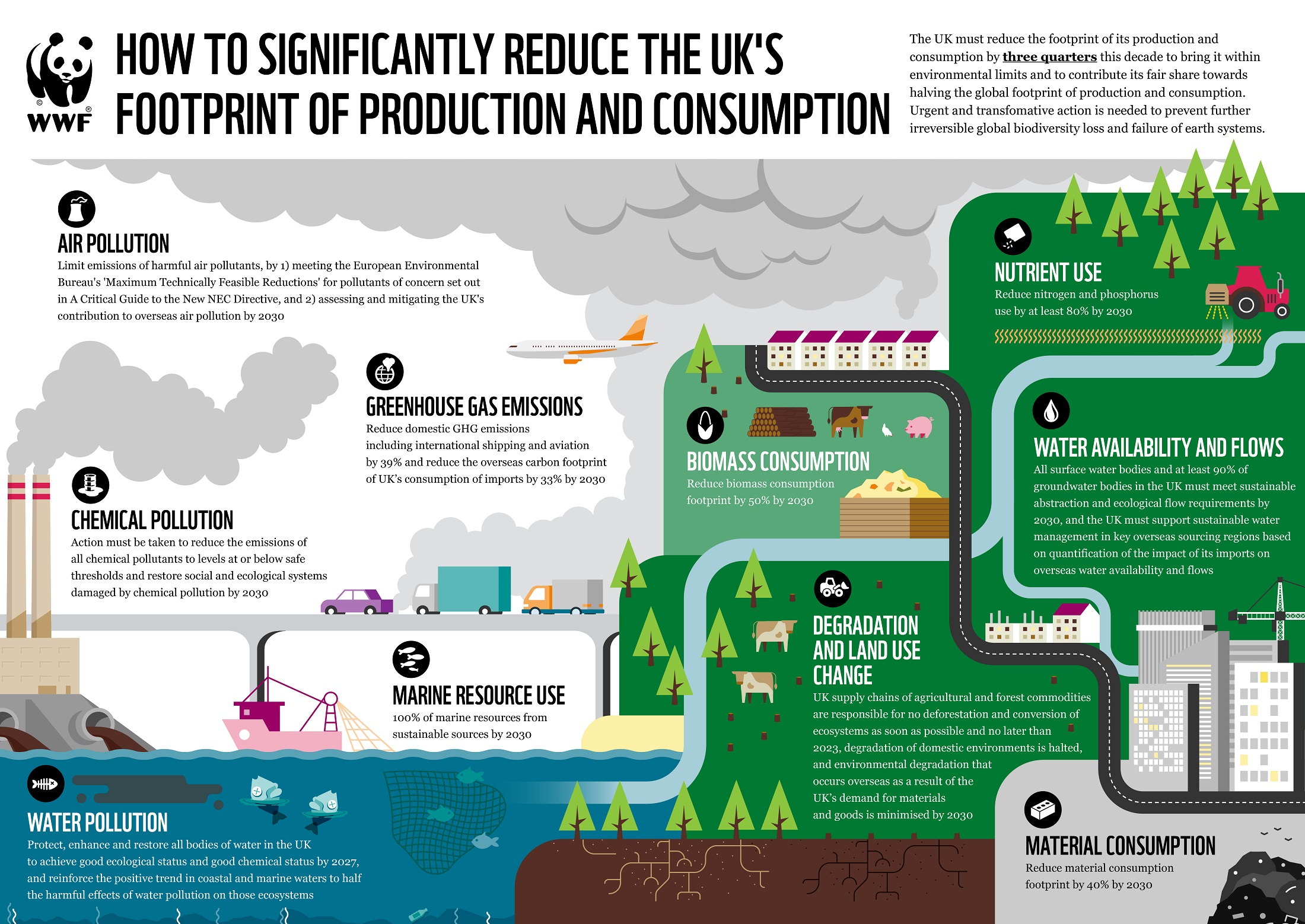

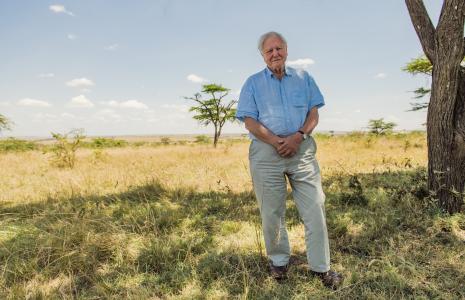
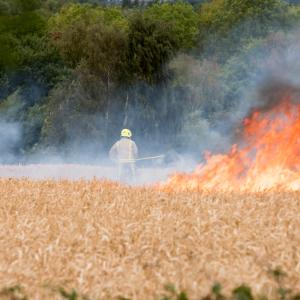 Our fight against climate change and global warming
Our fight against climate change and global warming
 Here are 10 myths about climate change
Here are 10 myths about climate change
 About WWF-UK
About WWF-UK
 5 threats to UK wildlife
5 threats to UK wildlife